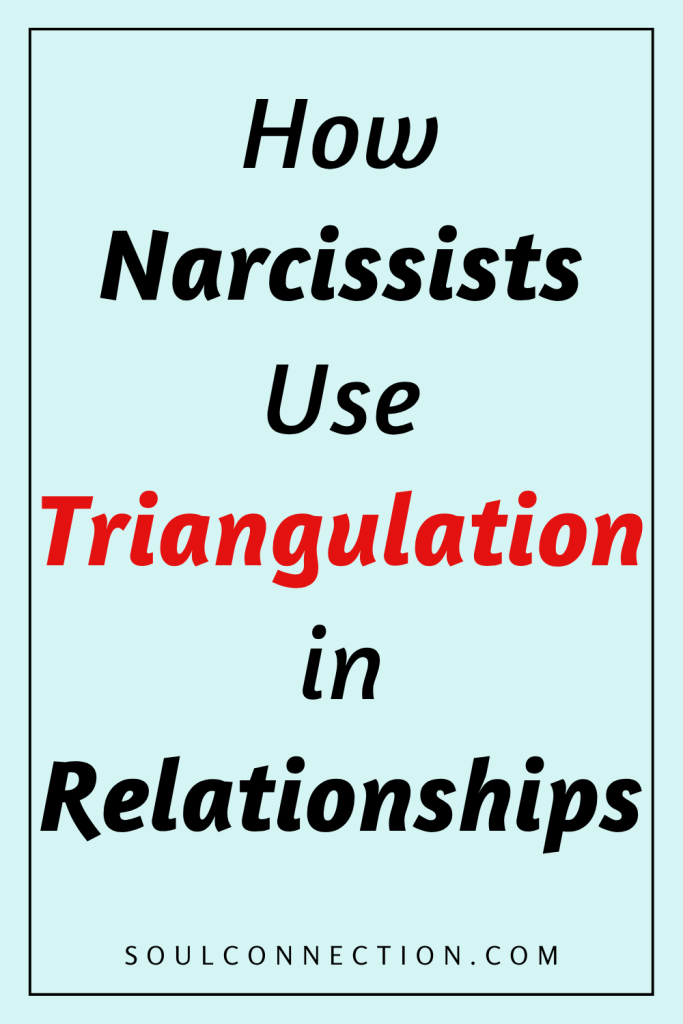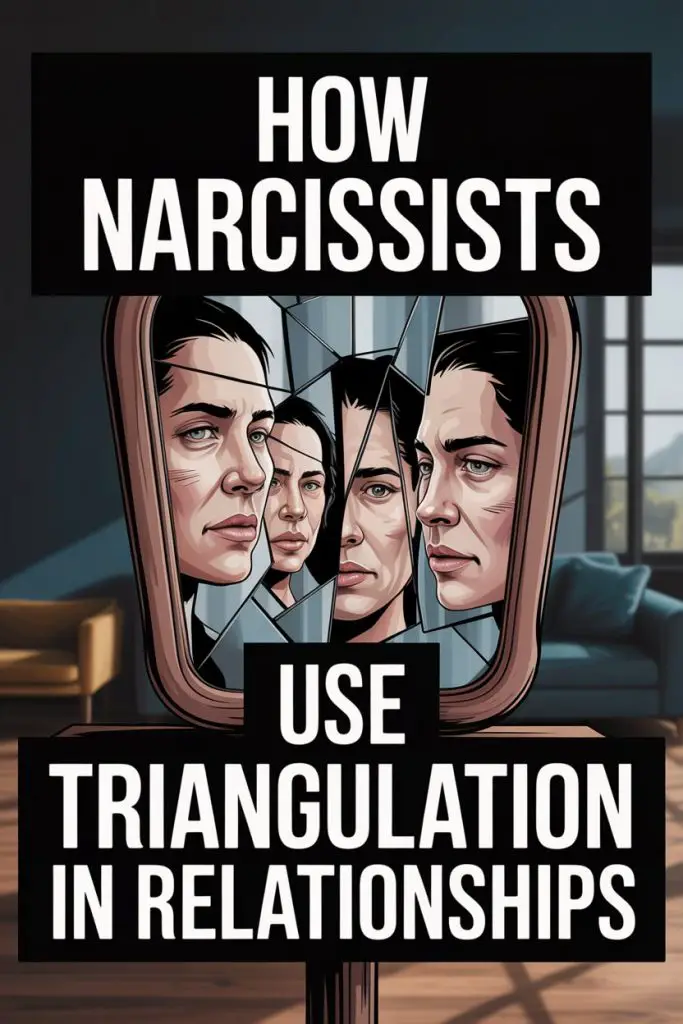Relationships should come with a warning label: contents may shift during emotional turbulence.
Add a narcissist and suddenly you’re not just navigating romance—you’re stuck in an amateur production of Survivor. Except, instead of outwitting each other for a million bucks, you’re left gaslighting yourself for free.
Ready to spot the plot twists? Let’s talk about triangulation—the narcissist’s favorite party trick.
What on Earth Is Triangulation?
Triangulation isn’t some complicated geometry equation you forgot after high school.
In the context of relationships, it’s the fine art of dragging a third person (or even an idea, a group, or a vague “someone said”) into the mix to stir the emotional pot.
Narcissists wield triangulation like it’s their Harry Potter wand. The goal? Keep you off balance, vying for their approval, and always second-guessing which way’s up.
Suddenly, conflict is no longer between two people—it’s turned into a messy group project nobody volunteered for.
Spotting Triangulation in the Wild
Triangulation can be subtle or as obvious as socks with sandals. The narcissist might:
- Compare you unfavorably to an ex, friend, or mysterious “everyone else”
- Confide in someone else about your relationship issues, then let you know all about it
- Make you feel like you’re in a competition, even if you don’t know what the prize is
- Use kids, parents, or colleagues as emotional pawns (yes, even the dog isn’t safe)
Sound familiar? If you find yourself wondering why you’re suddenly jealous of your partner’s “very close” coworker—or why your private arguments are public knowledge at family dinners—triangulation may be afoot.
Why Narcissists Love Triangulation
Narcissists feed off control, admiration, and a steady supply of attention (affectionately called “narcissistic supply”). Triangulation delivers all three, hot and fresh.
By pitting people against each other, they:
- Keep everyone focused on them
- Create drama, then play the hero or the victim
- Avoid accountability by shifting blame
- Make themselves look special, important, or in demand
Their inner monologue? “Who needs healthy communication when you can keep everyone dancing around your ego?”
Classic Triangulation Tactics
Every narcissist has their own signature move, but some favorites pop up again and again.
The Ex-Factor
Narcissists love evoking the ghost of relationships past. Suddenly, their ex was “so supportive,” “never complained,” or “always understood.”
You, dear reader, are now in a one-person audition for the role of World’s Best Partner.
This isn’t about nostalgia. It’s about making you feel insecure and desperate to win their approval. Shocking, right?
The Flying Monkey Brigade
Why manipulate just one person when you can outsource the work? Narcissists often recruit friends, family, or even therapists to reinforce their version of reality.
These “flying monkeys” (yes, we borrowed that from The Wizard of Oz) might confront you, give you unsolicited advice, or look at you sideways at brunch.
Suddenly, it’s not just your partner criticizing you—it’s the Greek chorus.
The “Concerned Friend”
There’s always that one friend or relative who “just wants what’s best for you.” A narcissist might say, “Even my mum thinks you’re too sensitive,” or “My best mate noticed you’ve been moody.”
Translation: they’ve been stirring the pot behind your back.
Now you’re left defending yourself to people who really shouldn’t be part of your relationship in the first place.
The Jealousy Provoker
Some narcissists thrive on jealousy like a plant thrives on sunlight. They’ll flirt openly, mention how attractive other people find them, or keep you guessing about their loyalty.
The message is clear: “If you don’t keep me happy, someone else will.”
Spoiler: no matter what you do, it’s never enough.
How Triangulation Impacts Relationships
The aftermath of triangulation isn’t pretty. Emotional trust—which takes ages to build—evaporates faster than cheap wine at a family reunion.
You may start to:
- Doubt your own feelings and instincts
- Compete with people who were never in the running
- Isolate yourself out of embarrassment or insecurity
- Walk on eggshells, scared of setting off the next “incident”
- Feel like a supporting actor in your own life
Left unchecked, triangulation erodes intimacy, communication, and even sanity. Relationships shift from partnership to a no-holds-barred emotional reality show.
Why It Feels So Confusing
Narcissists are master illusionists. One minute, you’re showered with affection; the next, you’re living rent-free in their web of drama. Triangulation amplifies this confusion.
Every time a third party is introduced, your gut instinct (that little voice that says, “Wait, this feels weird”) gets drowned out by self-doubt.
Instead of trusting your feelings, you start playing detective: “Did I really say that? Am I overreacting? Is their ex really that amazing?”
This constant second-guessing keeps you stuck—right where the narcissist wants you.
Recognizing Triangulation Without Gaslighting Yourself
Awareness is your secret weapon. If every disagreement ends with you being compared unfavorably to someone else, or if your partner can’t have a conversation without name-dropping a third party, triangulation is likely in play.
Ask yourself:
- Do I feel like I’m competing for my partner’s attention or approval?
- Are private issues suddenly public knowledge?
- Do I leave conversations feeling confused, guilty, or not good enough?
- Is my partner always “the victim” or “the hero”?
If your relationship feels like an endless group project—with zero credit and all the blame—the problem might not be you.
How to Shut Down Triangulation
Taking your power back doesn’t require a PhD in psychology—it just takes some practice, boundaries, and maybe a pinch of stubbornness.
Call Out the Behavior
Stating the obvious can work wonders. “I don’t want our issues discussed with other people,” or “It makes me uncomfortable when you compare me to your ex,” sets clear expectations.
Will the narcissist act shocked? Absolutely. That’s practically their job description. Stand your ground.
Set Boundaries Like a Pro
Boundaries are not suggestions; they’re requirements. Insist on keeping your relationship problems between the two of you (unless professional help is involved).
Don’t participate in competitions you never signed up for.
If your partner brings in third parties, a simple, “That’s between us” can be surprisingly effective. If they refuse? That tells you all you need to know.
Guard Your Self-Esteem
Triangulation is designed to wear you down. Remember: your worth isn’t measured against your partner’s ex, their work spouse, or Great Aunt Mildred’s opinion.
If you find yourself spiraling, step back and ask, “Is this about me, or about them needing attention?”
Taking care of your own mental health—therapy, supportive friends, solo Netflix binges—matters more than outdoing anyone else.
Don’t Let the Flying Monkeys Get You Down
Friends and family may get caught in the crossfire, unwittingly acting as mouthpieces for the narcissist. Keep your conversations private, and don’t fuel the gossip mill.
If someone approaches you with “concerns,” calmly state, “Thanks for your input, but our relationship is between us.” Then go back to your coffee.
Exit the Drama Stage Left
Sometimes, the healthiest move is leaving the triangulation circus entirely.
If your partner consistently refuses to respect boundaries or stop bringing others into your relationship, consider whether this is a show you want front-row seats to.
Spoiler: your ticket out is always valid.
When Kids Get Pulled In
Triangulation doesn’t stop at romantic relationships. Co-parents, take note: narcissists will happily use children as pawns, painting one parent as the villain and themselves as the misunderstood hero.
If this is happening, prioritize your child’s well-being. Keep your communication direct, refuse to bad-mouth the other parent, and create a safe, drama-free zone whenever possible.
Your kid deserves an actual childhood, not a starring role in their parent’s emotional soap opera.
Healing After Triangulation
Recovering from triangulation takes time, patience, and maybe a strong cup of tea (or something stronger). The first step is recognizing what happened wasn’t your fault.
Rebuild your confidence by reconnecting with trusted friends, pursuing activities that make you feel good, and reminding yourself that a healthy relationship doesn’t require Olympic-level emotional gymnastics.
Therapists can help untangle the mess narcissists leave behind, giving you tools to spot manipulation before it takes root again.
The Power of Trusting Yourself Again
Triangulation loses its power when you refuse to play the game. Healthy relationships thrive on trust, communication, and partnership—not jealousy, competition, or endless drama.
You are enough. Your feelings are valid. Anyone still comparing you to their ex is welcome to join them.
There’s more to life than starring in someone else’s drama. And when in doubt? Remember: you’d make a terrible supporting character anyway. The lead role suits you much better.


